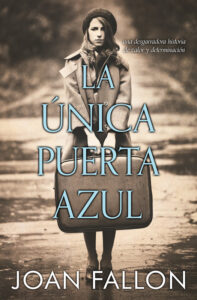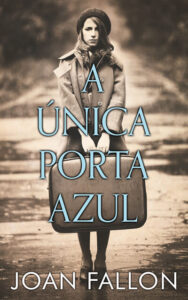Click here for a PREVIEW
It is only two days later that the news arrives. Billy sees him first. He shouts upstairs to tell her. She looks out of the window and watches as the boy leans his bicycle against the post box and wanders along the street looking at the numbers on the doors. When he gets to their own blue door he stops, checks the envelope again and knocks. She feels a tightness in her chest and is unable to move. Irene knows from the moment the boy’s knuckles rap on her door that this marks the end of one life and the start of another. They will all remember that sound for a long time to come. She does not run to see is it good news or bad; her legs will not move. She lets Billy open the door and take the yellow envelope. She hears the voice of a young man, high and reedy.
‘Mrs Smith?’
‘Yes, that’s my Mum.’
‘Mrs Ronald Smith?’
‘Yes.’
‘OK son, give this to yer mum.’
She hears the door close and the sound of Billy’s feet running down the passage.
‘Mum, it’s a telegram,’ he cries, waving it in the air.
‘Maybe it’s to say Dad’s coming home,’ suggests Maggie.
She has Grace on her lap and is brushing her hair.
‘Thank you darling,’ Irene says.
She takes the envelope from him and slips it into the pocket of her apron.
‘Come on Mum. Aren’t you going to open it?’
‘Yes, open it, Mum.’
She looks at the fresh, hopeful faces of her children and the tears begin to form in her eyes. She pulls out the standard yellow envelope and holds it against her cheek. The only other telegram she has ever received was on the day of their wedding; Ronnie’s aunt May had sent it. ‘To wish you a long and happy married life,’ it said.
‘Mum.’
Maggie is hopping from foot to foot in anticipation.
Carefully Irene takes out a knife from the kitchen drawer and slides it under the fold of the telegram. She can sense the children’s eyes on her. She pulls out the folded paper and opens it.
‘WE REGRET TO INFORM YOU …’
The words stab at her heart as she tries to focus. The uniform printed letters dance in front of her eyes; she can hardly make out what they say.
‘WE REGRET TO INFORM YOU THAT PRIVATE RONALD BRUCE SMITH HAS BEEN KILLED IN ACTION …’
She struggles for breath. Her heart is banging so loudly she cannot hear what her children are saying. She thinks she will collapse.
‘What’s it say Mum?’
‘Is he coming home? Is Dad coming home?’
‘Mummy. What’s it say?’
‘What’s the matter Mum? Mum? Is it about Dad?’
Irene lets out a long, agonised moan. Her legs give way under her and she grabs at the edge of the table to steady herself.
‘What’s the matter Mum?’
‘Mummy, why are you crying?’
No, not her Ronnie, it can’t be her Ronnie. Please God, let it be a mistake. But deep inside she knows it is no mistake. She looks at the anxious faces of her children; she has to be strong for them. She has to give them an answer.
‘No darlings, Daddy’s not coming home.’
The words are barely a whisper. She cannot hold back the tears.
‘Don’t cry Mummy,’ says Grace, clinging to her mother’s leg. ‘Don’t cry.’
The children crowd round her, each trying to comfort her in their own way. Maggie pulls out a chair so she can sit down. Billy anxiously pats her hand and Grace climbs up onto her knee and puts her podgy arms around her mother’s neck.
‘Does he have to go to another war now?’ asks Billy.
There is a lump in her throat that threatens to choke her; she swallows hard and says:
‘No, darling, he’s not going to go to any more wars, ever again.’
‘So he can come home then,’ says Billy, with a little skip of pleasure.
Maggie picks up the telegram from the table.
‘No, silly, he’s not ever coming home again. He’s been killed. Killed in action.’
She flings down the telegram and runs from the room.
‘Maggie …’
Irene does not have the strength to go after her daughter. She hugs her other children to her, rocking them back and forth like she used to do when they were babies. Billy is quiet now. Grace is crying. She tries to comfort them but she does not know what to say. What can she say? It just is not fair. Ronnie was a good man, a kind man; he was her husband. He was too young to die. And they are all too young to live without him. This bloody war. It is so unfair.






